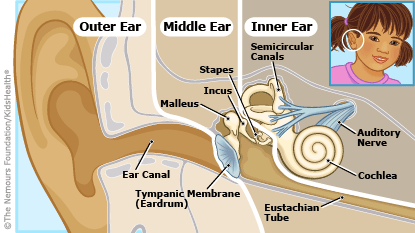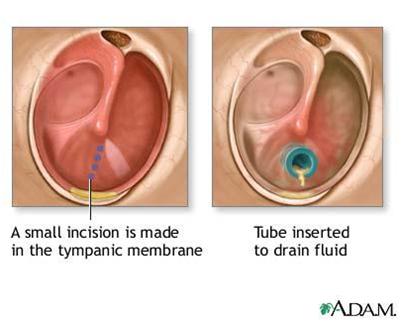Ear Infections and Fluid in the Middle Ear Can Cause Speech Delays

Image Courtesy of frenchtribune.com
It is not uncommon for infants and toddlers to experience fluid in the middle ear or ear infections at some point during their early years. However, long-term ear infections or fluid in the middle ear that may go untreated can cause speech delays that may require some form of speech therapy.
What is the Difference between Ear Infections and Fluid in the Ear?
The immature structure of a baby or toddler’s ear can make it more difficult for fluid to drain from the middle ear. Sometimes this fluid becomes infected, by either a virus or bacteria, and causes the tell-tale signs of a childhood ear infection: crying, pulling at the ears, general fussiness, fever, and difficulty sleeping. Whether or not your child requires antibiotics to treat the ear infection depends on the source of the infection and your pediatrician’s recommendations. Some at home treatments include OTC pain relief and warm compresses to alleviate the initial and immediate pain.
This fluid does not always become the source of an actual infection, so the fluid can remain in the middle ear without causing the typical symptoms of an infection. The signs of fluid in the middle ear can be as subtle as a slight loss of balance and changes in eating habits to hearing and speech related symptoms. Because fluid in the middle ear that is not infected often causes no pain in children, the condition can go left undiagnosed and untreated for a long period of time, increasing the likelihood of more severe symptoms down the road.
How Do Ear Infections and Fluid in the Middle Ear Affect Hearing and Speech?
Children first learn to speak by hearing, and the first three years of life are crucial to their language development skills. During these years they are hearing sounds modeled for them, and while they might not be speaking in complete sentences, they are learning how to form the sounds needed for fluent speech. Ear infections and excess fluid in the ears can result in hearing loss, even if it is temporary. Imagine you are walking around underwater and the sounds are all distorted – this is what the world might sound like to a child with fluid in her ears, and this problem can be amplified if there is pain associated with it. When problems exist and hearing loss for any reason occurs, there is an increased risk that a child will have a speech delay.
Ear infections in childhood are often more easily recognized and therefore more quickly treated, reducing long-term consequences on hearing and speech development. You wouldn’t be the first parent, however, to not recognize the signs of uninfected fluid in the middle ear. Some of the first signs you might see include:
- A loss of speech – meaning that while your child was beginning to form sounds and words, she is not progressing in her speech habits
- Asking What? Repeatedly – your child frequently needs to have things repeated
- Your child doesn’t seem to understand you unless she can see your face and read your lips
- Your child’s speech development does not seem to be coinciding with typical milestones
What Can I Do to Help My Child Overcome Ear Issues and Speech Delays?
The first step is to have your child’s hearing tested and ears examined if you suspect fluid in the ear or another cause of hearing loss might be the cause of your child’s speech delays. Some children with poorly formed or matured ear structures benefit from having tiny tubes placed in their ears to drain the fluid. Many parents also find it helpful to work with an ENT – a doctor who specializes in the Ear, Nose, and Throat.
Once the hearing issues have been diagnosed, work with your pediatrician to see what kinds of speech therapies can be helpful for your child. Some children who miss that critical window of speech development because they had temporary hearing loss benefit tremendously from working with an SLP to get caught up with developmental milestones. You can also help your child at home by speaking clearly, using precise language (perhaps single words for specific items), reducing background noise, and remembering that your child might be older now but needs some patience to recover that lost time in speech development.




